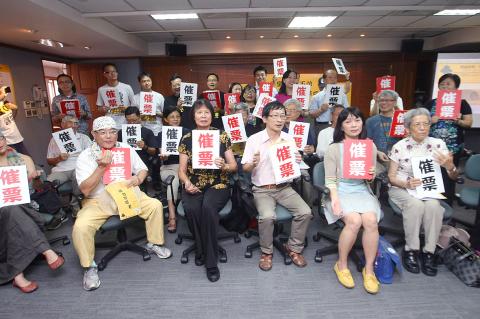Several civic groups yesterday announced a new alliance dedicated to permanently ending the construction of the Fourth Nuclear Power Plant in Gongliao (貢寮), New Taipei City (新北市), by soliciting votes in a national referendum proposed to decide the plant’s fate.
Since the referendum proposal is on the agenda of the extra legislative session called by the Chinese Nationalist Party (KMT) caucus that starts today, representatives of civic groups said they are ready to mobilize people to vote against completing the facility.
Humanistic Education Foundation chairman Shih Ying (史英) said that since all previous national referendums have failed to meet the threshold of half of all eligible voters — about 9 million voters — needed to be pass and the nuclear issue is one that concerns all Taiwanese, it was crucial to solicit enough votes to abort the plant’s construction and operation.

Photo: CNA
“If 100,000 of the 300,000 people who attended the anti-nuclear power demonstrations held on March 9 each solicit 10 votes against the Gongliao plant, that makes 1 million votes,” he said, adding that this million could make the difference in validating the referendum.
“If we can’t stop the referendum from being held, then let it be held sooner because we are ready to turn it into an anti-nuclear national movement. Just wait and see,” said theater director Ko I-chen (柯一正), a frequent participant in anti-nuclear demonstrations who constantly urges the public express their concerns about atomic energy.
National Taiwan University Hospital physician Ko Wen-je (柯文哲) said that while some people think the 2011 Fukushima Dai-ichi nuclear power plant disaster occurred only because a tsunami and an earthquake struck Japan, local anti-nuclear groups need to remind the public that Taiwan is hit by such natural disasters just as frequently as Japan.
“The government should think carefully about whether it can withstand the consequences of a Cabinet overthrow if anti-nuclear groups solicit more than of all eligible voters to strike down the plant via the referendum,” he added.
The creators of the alliance comprised representatives from 27 civic groups and individuals such as musicians, artists and professors.

‘DENIAL DEFENSE’: The US would increase its military presence with uncrewed ships, and submarines, while boosting defense in the Indo-Pacific, a Pete Hegseth memo said The US is reorienting its military strategy to focus primarily on deterring a potential Chinese invasion of Taiwan, a memo signed by US Secretary of Defense Pete Hegseth showed. The memo also called on Taiwan to increase its defense spending. The document, known as the “Interim National Defense Strategic Guidance,” was distributed this month and detailed the national defense plans of US President Donald Trump’s administration, an article in the Washington Post said on Saturday. It outlines how the US can prepare for a potential war with China and defend itself from threats in the “near abroad,” including Greenland and the Panama

The High Prosecutors’ Office yesterday withdrew an appeal against the acquittal of a former bank manager 22 years after his death, marking Taiwan’s first instance of prosecutors rendering posthumous justice to a wrongfully convicted defendant. Chu Ching-en (諸慶恩) — formerly a manager at the Taipei branch of BNP Paribas — was in 1999 accused by Weng Mao-chung (翁茂鍾), then-president of Chia Her Industrial Co, of forging a request for a fixed deposit of US$10 million by I-Hwa Industrial Co, a subsidiary of Chia Her, which was used as collateral. Chu was ruled not guilty in the first trial, but was found guilty

A wild live dugong was found in Taiwan for the first time in 88 years, after it was accidentally caught by a fisher’s net on Tuesday in Yilan County’s Fenniaolin (粉鳥林). This is the first sighting of the species in Taiwan since 1937, having already been considered “extinct” in the country and considered as “vulnerable” by the International Union for Conservation of Nature. A fisher surnamed Chen (陳) went to Fenniaolin to collect the fish in his netting, but instead caught a 3m long, 500kg dugong. The fisher released the animal back into the wild, not realizing it was an endangered species at

DEADLOCK: As the commission is unable to forum a quorum to review license renewal applications, the channel operators are not at fault and can air past their license date The National Communications Commission (NCC) yesterday said that the Public Television Service (PTS) and 36 other television and radio broadcasters could continue airing, despite the commission’s inability to meet a quorum to review their license renewal applications. The licenses of PTS and the other channels are set to expire between this month and June. The National Communications Commission Organization Act (國家通訊傳播委員會組織法) stipulates that the commission must meet the mandated quorum of four to hold a valid meeting. The seven-member commission currently has only three commissioners. “We have informed the channel operators of the progress we have made in reviewing their license renewal applications, and